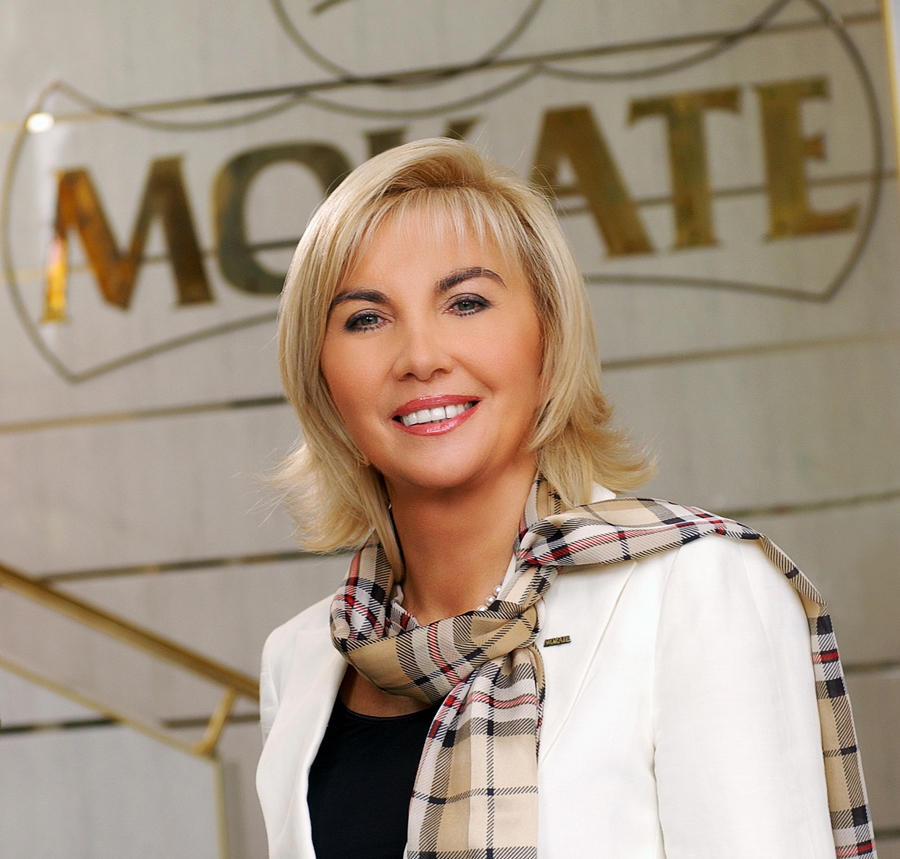Several years ago Mokate was such a company, whose IT systems did not follow its quick development. According to the management estimation, the growing scale of operations along with the number of products and entering new market segments made it hard for the solutions used before (including Impuls system made by BPSC) to meet growing reqiurements of the multi-tude and updating decision-taking data supplied by them.
‘A good decision requires an access to reliable, clear data here and now. In order to let the company grow further, it needs an IT tool that will never hinder its growth’, said Piotr Łopatka, SAP project manager in Mokate.
Preparation
What were the Mokate management’s expectations of its target IT system? First, an access to management information of the highest quality – multi-dimensional reports on sale and profitability.
Secondly, an improvement in a planning process in the logistic chain, from sale to production planning to purchase planning and stock optimization.
In April 2002 the decision to choose SAP was taken, as it was decided that this system best met current company’s business requirements, offered unlimited possiblities of development, and was tested by food industry leaders in Poland and worldwide. The execution of the project was commissioned to BCC (now All for One Poland).

Teresa Mokrysz, the Mokate owner
‘Mokate is a purely Polish company which during ten years of operations has grown from a small family business to a leader in its area and one of the best known Polish companies abroad. I am convinced that using SAP systems will help us enforce our market position and ensure good conditions for growth for long years, without limitations like in case of our previous IT solutions’, said Teresa Mokrysz, the Mokate owner.
Actual implementation works were preceded by a deep analysis of financial and logistic processes in Mokate.
During the analysis BCC consultants learned about business processes in Mokate and information needs of users and the management. In result they defined in detail the range of the future implementation and presented Mokate a specification of suggested organizational changes.
One of the elements of the analysis was also an evaluation of the possiblities to use SPRINT, a preconfigured SAP system for middle businesses offered by BCC. BCC consultants evaluated the consistency of Mokate target business processes with the processes preconfigured in SPRINT.
After favourable results it was decided to use SPRINT.
The scope of SAP implementation in Mokate
- financial accountancy (FI)
- fixed assets accountancy (FI-AA)
- treasury (TR)
- controlling (CO)
- material management (MM)
- production planning (PP)
- sales and distribution (SD)
The timetable set the implementation start for June 2002. The start of the system was planned for January 2003. However, still during the implementation Mokate management decided to expand the range of the project defined before by a production planning area, which resulted in postponing the SAP starting date to July 2003.
The implementation covered two plants: Mokate SA in Ustronie and Mokate sp. z o.o. in Żory.
Advantages of SPRINT for Mokate
Firstly, the possiblity to use best practices, included in SPRINT model that had been prepared on the basis of experience from SAP implementations throughout the world and the knowledge and skills BCC (now All for One Poland) gained during its long cooperation with the leaders of the Polish food market.
Where it was necessary, the standard SPRINT was expanded by the characteristic traits of Mokate operations. This concerned, for example, changes to postings of transactions realized by the unit in Żory in a special economic zone, but also planning procedures for order and discrete manufacturing, planning and settling costs of coffee, tea and creamers.
SPRINT methods also meant (in comparison with a model used at ‘classic’ SAP implementations) decreasing Mokate employees’ involvement into the project, which for a middle-sized business, with a limited number of people, is a big advantage.
Mokate employees provided the knowledge about the company’s processes, verified test results, while BCC consultants took over the duty to prepare system configuration, carry training and provide support during the productive start. Thanks to that the employees involved into implementation works could perform also their other tasks.
Another advantage was limiting the time and costs of SAP implementation. Starting such a wide range of SAP without using ready-made (preconfigured) functions ‘inserted’ into SPRINT would require more service days performed by implementation consultants.
According to the final timetable Mokate started using SAP system in July 2003, in all the planned range.
Result – management information always at hand
Thanks to SAP implementation the availability of analytical information increased greatly without the necessity to put an additional load on financial and accountancy departments of Mokate.
The result was gained through making postings in financial accounting automatic.
This concerns postings related to logistic and manufacturing processes, like those appearing when materials are received in a warehouse, or are despatched for manufacture, or during posting sales invoices. A chart of accounts was simplified to a great extent with introducing the processes characteristic of postings in special economic zone.
Also the mechanisms of electronic bank transfers and bank statements were introduced.
Manual operations in accountancy department and manual data transfer between systems were limited, which allowed to limit the number of errors in accountant documents.
Also the time of closing up a settlement period procedure was greatly shortened; now the accounting department may smoothly, even immediately after the end of a period (during a few hours) prepare relevant reports for offices and the management.
A vital step forward was starting tools to manage cash resources in the system. The finance director in Mokate can make a liquidity report at any time and break down the amount of cash takings and expenses (for international transactions it is done also with consideration for exchange rates expected as at the date of transaction).
The amounts come from real settlement items, connected with purchase and sales invoices. They also take into consideration future documents, like issued orders for supplies or accepted sales orders. Together with the values of balances at bank accounts they give full information on a projected state and movements in cash resources.
SAP also includes a full file of fixed assetes elements. The register is kept in few variations, like a separate one for balance needs and another for tax purposes.
Jan Gałuszka, Mokate finance director evaluates the progress in finance management: ‘The employees of finance departments are less loaded with work than before SAP implementation, and the availability and quality of analytical information have greatly improved. For example, thanks to a liquidity projection now I know very well what income and expenses I can expect today, next Tuesday or in 120 days. With an access to the structure of cash flow, I can flexibly steer liquidity.’
Expenses in real time
One of more important assumptions of the implementation was also gaining a detailed information on the structure of manufacturing costs. The information is now gathered in real time in controlling reports.
Based on material specification and technological routes prepared by Mokate technologists one can create calculations of product costs split into every kind of material or the cost of operations resulting from technology. Thanks to that the analysts can, for example, compare real costs of cappuccino manufacturing divided into all ingredients (raw materials, half-products, packaging etc.) with approved planned costs.
Information about the real structure of production costs and deviations from the plan enables to react swiftly and take decisions that will ensure keeping an appropriate level of production profitability.
Gaining detailed information about the structure of production costs would not be possible without a detailed analysis of indirect costs borne by the departments of the company.
SAP system reflects all the structure of cost centres and introduces the so called internal orders, which for example allow to gather information on marketing actions costs or investment costs. Today at every time one can find e.g. current costs of TV advertisements with information about how much of the costs fall on each product (eg. Biały Miś, a chocolate drink with vitamines).
The information system in controlling is very much integrated with the area of sales and distribution. Mokate uses one common data base of customers and products for all units. This gives a possibility to control the credit limit of customers both on the level of all the company and on the level of the units in Ustronie i Żory.
Innovations in sales
The oder-based sale cycle enables to follow closely a status of a processed order, thanks to which the salesmen know how many products a particular customer ordered and when the delivery is.
The value of realized deliveries and invoiced sales are posted in real time on the ledger accounts without users’ intervention. Simultaneously analytic information is collected to help detailed and wide analysis of sales income and sales costs.
Now the sales director always knows the assortment of delivieries to a supermarket chain or other customers or customer groups. He or she can also check the level of income on Assam tea in 100g packaging gained by a salesman Kowalski in Białystok, for example.
The analysis of income and profitability is possible to make in real time in every combination of factors such as product, customer, salesman or distribution channel.
Urszula Holeksa, commercial department director, comments: ‘Now one click on a mouse is enough to get daily or periodical sale reports. At any time I can see how big the sales of instant coffee in Katowice are and who buys it. I can also see how many and how high discounts we granted to every customer.’
A more efficient delivery chain
The system enabled full management of delivery chain in materials and services. Purchase orders are created in the system with consideration for the existing stock and material needs resulting from production plans introduced into a production planning module.
Purchase department employees may be now sure that the volume of orders for coffee beans, sugar or coconut oil takes into consideration the stock avaiable in warehouses and results directly from the planned production volume of cappuccino, for example.
This gives a guarantee that in the process of planning supplies needs of MRP takes into consideration direct needs of raw materials and half-products used in manufacturing particular products and indirect needs of materials that are elements of the used half-products.
Material management reports help fully analyze the quantity and value of stock.
The current IT system that gives management information of such reliability and completeness will surely not be an obstacle to Mokate growth. The data are now easily available and presented in clear reports, which allows managers to take right decisions – both current and those that define strategic directions of the company’s development.
‘Thanks to SAP in Mokate we got the analytic possibilities we had not had before. Now we can report a structure of real manufacturing costs down to single postings or analyse sales profitability in any defined segment of the market we operate. And all this in real time, immediately after making operations in the system. Those data are invaluable in management terms and in my opinion it is the key to strengthening our market position, which also gives a solid base to company’s long-term growth’, sums up Teresa Mokrysz.
Mokate is one of the most spectacular examples of a dramatic development of a Polish company in last 15 years; from a family trade company to a potentate in the domestic market, sucessfuly exporting its products to many countries in the world. Now it is one of the biggest coffee producers in Poland that for years has been keeping its leading position in instant cappuccino production (over 65% market share). After taking over one of the biggest tea manufacturers in Poland, Mokate has become a strong competitor also in this segment. Mokate goods are produced in two modern plants: in Ustronie near Wisła and Żory. Mokate has also units abroad – in the Czech Republic, Slovakia and Hungary.


